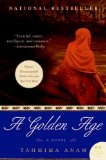Summary | Excerpt | Reading Guide | Reviews | Beyond the Book | Readalikes | Genres & Themes | Author Bio

Chapter One
March 1971
Shona with her back to the sun
Every year, Rehana held a party at Road 5 to mark the day she
had returned to Dhaka with the children. She saved her meat rations and made
biryani. She rented chairs and called the jilapi-wallah to fry the hot, looping
sweets in the garden. There was a red-and-yellow tent in case of rain, lemonade
in case of heat, cucumber salad, spicy yoghurt. The guests were always the same:
her neighbour Mrs Chowdhury and her daughter Silvi; her tenants, the Senguptas,
and their son, Mithun; and Mrs Rahman and Mrs Akram, better known as the
gin-rummy ladies.
So, on the first morning of March, as on the first morning of
every March for a decade, Rehana rose before dawn and slipped into the garden.
She shivered a little and rubbed her elbows as she made her way across the lawn.
Winter still lingered on the leaves and in the wisps of fog that rolled over the
delta and hung low over the bungalow.
She dipped her fingers into the rosebush, heavy with dew, and
plucked a flower. She held it in her hand as she wandered through the rest of
the garden, ducking between the wall-hugging jasmine and the hibiscus, crossing
the tiny vegetable patch that was giving them the last of the season's
cauliflower, zigzagging past the mango tree, the lemon tree, the shouting-green
banana tree.
She looked up at the building that would slowly, over the course
of the day, cast a long shadow over her little bungalow. Shona. She could still
hear Mrs Chowdhury telling her to build the new house at the back of her
property. 'Such a big plot,' she'd said, peering out of the window; 'you can't
even see the boundary it's so far away. You don't need all that space.'
'Should I sell it?'
Mrs Chowdhury snapped her tongue. 'Na, don't sell it.'
'Then what?'
'Build another house.'
'What would I do with another house?'
'Rent, my dear. Rent it out.'
Now there were two gates, two driveways, two houses. The new
driveway was a narrow passage that opened into the back of Rehana's plot. On the
plot stood the house she had built to save her children. It towered above the
bungalow, its two whitewashed storeys overlooking the smaller house. Like the
bungalow, it had been built with its back to the sun. The house was nearly ten
years old now, and a little faded. Ten monsoons had softened its edges and drawn
meandering, old-age seams into the walls. But every day, as Rehana woke for the
dawn Azaan, or when she went to put the washing in the garden, or when, after
bathing, she fanned out her long hair on the back of a veranda chair, Rehana
looked at the house with pride and a little ache. It was there to remind her of
what she had lost, and what she had won. And how much the victory had cost. That
is why she had named it Shona, gold. It wasn't just because of what it had taken
to build the house, but for all the precious things she wanted never to lose
again.
Rehana turned back to the bungalow and entered the drawing room.
She ran her palm across the flat fur of the velvet sofa, the dimpled wood of the
dining table. The scratched, loved, faded whitewash of the veranda wall.
She unfurled her prayer mat, pointed it westwards and sank to
her knees.
This was the start of the ritual: wake before sunrise, feel her
way around the house; pray; wake the children.
They were not children any more. She had to keep reminding
herself of this fact. At nineteen and seventeen, they were almost grown up. She
clung greedily to the almost, but she knew it would not last long, this
hovering, flirting with adulthood. Already they were beings apart, fast on their
way to shedding the fierce, hungry mother-need.
Rehana lifted the mosquito net and nudged Maya's shoulder. 'Wake
up, jaan,' she said. 'It's our anniversary!'
She went to Sohail's room and knocked, but he was already awake.
'For you,' she said, holding out the rose.
The foregoing is excerpted from A Golden Age by Tahmima Anam. All rights reserved. No part of this book may be used or reproduced without written permission from HarperCollins Publishers, 10 East 53rd Street, New York, NY 10022.
Poetry is like fish: if it's fresh, it's good; if it's stale, it's bad; and if you're not certain, try it on the ...
Click Here to find out who said this, as well as discovering other famous literary quotes!
Your guide toexceptional books
BookBrowse seeks out and recommends the best in contemporary fiction and nonfiction—books that not only engage and entertain but also deepen our understanding of ourselves and the world around us.